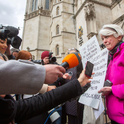Welcome to the Weekly Constitutional, where a judgment or other formal document is taken as a starting point for exploring a matter of law and policy. This week the text is this 2021 judgment of the Supreme Court of the United Kingdom.
Should a government be able to pick and choose which court orders it will comply with and which ones it can disregard? This question has become very topical over the last few weeks with reports that the executive in the United States is prepared to defy court orders, and may already be doing so. “Judges aren’t allowed to control the executive’s legitimate power,” posted the newly elected vice president JD Vance on social media.
Here it is important to note that “orders” are the outputs of a court in the same way legislation is the output of a legislature. An order sets out what a court requires a party to do under pain of penalty or sanction.
If a party disobeys an order, then there can be contempt or similar proceedings. But it rarely comes to this: the expectation is that orders of a court will be complied with. Such compliance is a fundamental element of the Rule of Law.
What happens next in the United States if the executive insists on non-compliance with court orders is unknown. If the federal government refuses to comply with the orders of the federal courts, then you will have a constitutional crisis: that is a serious constitutional situation the outcome of which cannot be foreseen.
The outcome may be political conflict, or it may be a dry squib, or anything in between. We do not and cannot know. (If you know what the outcome will be, then it really is not a “crisis” but a mere constitutional drama.)
Over here, however, a similar question has recently been decided by the Supreme Court of the United Kingdom. The issue before the court was whether the Home Office could decide not to comply with an order of a judge on the basis that the Home Office believed the judge had acted outside of their powers.
The facts of this case are fairly mundane, if rather spiteful. A judge made a bail order prohibiting a detainee from doing paid employment while on bail. The Home Office then insisted that the appellant could also not do any unpaid work in a charity shop. It was then pointed out that was not what the judge had ordered, and the Home Office maintained the bail order was defective and so did not apply.
One may think that there was a public good in allowing someone on bail to do unpaid work for the benefit of the community. One may also think that it would be a waste of taxpayers’ money for the Home Office to litigate such a point. But the Home Office had a different view. Unpaid work for a charity was intolerable and it would use the courts to stop it happening.
The detainee applied to the court for a judicial review. The Home Office opposed it. The tribunal hearing the case told the Home Office, in effect, to stop being silly and made declaration that the detainee remained on bail under the original conditions. The Home Office then appealed the tribunal decision to the Court of Appeal. It was apparently a matter of fundamental public importance that the detainee should be prevented from unpaid work in a charity shop.
Remarkably, the Court of Appeal nodded along with the Home Office. Drawing on cases to do with byelaws being “ultra vires” or defective, it ruled in favour of the Home Office. A defective court order did not need to be complied with. The detainee was given leave to apply to the Supreme Court.
The resulting Supreme Court judgment in this case may be the most significant constitutional judgment of that court of recent years. The Miller cases over what the government could do vis-à-vis parliament during Brexit are more eye-catching, but the fact of those cases are exceptional. The HS2 and Heathrow judgments are important for showing how the courts should be drawn into what are essentially policy questions, but they do not deal with basic constitutional doctrine.
But this 2021 judgment in the Majera case goes to the heart of our constitutional arrangements: can the executive choose to not comply with a court order when the executive (even with good reason) considers it defective?
The unanimous answer of the Supreme Court was a resounding “No”. An order of any court stands—even if it appears to be defective—until and unless that court order is varied or set aside by the courts (or overridden by primary legislation). The defective “byelaw” cases relied on by the Court of Appeal were a judicial red herring, for they dealt with byelaws and not court orders.
The Supreme Court concluded:
“Even assuming that the order was invalid, the Secretary of State was nevertheless obliged to comply with it, unless and until it was varied or set aside. The allegation that the order was invalid was not, therefore, a relevant defence to the application for judicial review of the Secretary of State’s decision. As there was no other basis on which the Court of Appeal reversed the Upper Tribunal, and the Secretary of State does not ask the court to dismiss the appeal on other grounds, it follows that the appeal should be allowed.”
The detainee won. Six years of hard-fought (and expensive) litigation established that he could do unpaid work in a charity shop while on bail, even if the Home Office did not like it. If the Home Office did not want him to be able to do this, or otherwise thought the order was defective, then it should have applied to the court for the order to be varied. But it could not just disregard an order.
That this is practically a significant case can be shown by it having already been cited by more than 40 other cases in the four years since it was decided. It is a matter of constitutional bread-and-butter that the executive be reminded that it has to comply with court orders unless and until a court varies or sets aside that order. It is not a decision that the executive can take by itself.
What should happen next in the United States is that similar judgments are made by the federal courts—and ultimately perhaps an emphatic sister judgment to Majera by the Supreme Court of the United States. That this should happen is a matter of basic constitutional law: court orders should be complied with.
Whether what should happen will happen is less clear. The US Supreme Court may find some basis for carving out an exception to what should be an absolute rule. After all, the US Supreme Court managed to find a basis for granting the president immunity from certain criminal prosecutions. It is not unthinkable that it will devise a similar approach to compliance with court orders.
If so, that will mean that the federal government can choose which court orders it complies with, just as it can now to a certain extent choose which criminal laws it will comply with. It would be a vast extension of executive power, and one which the Supreme Court in the United Kingdom has recently firmly ruled against.














